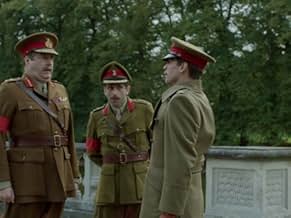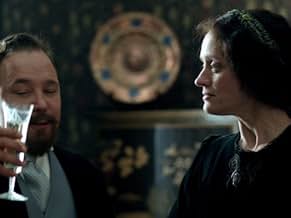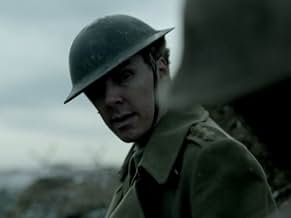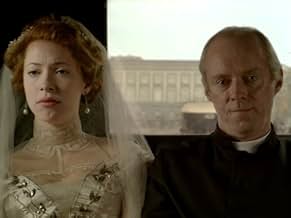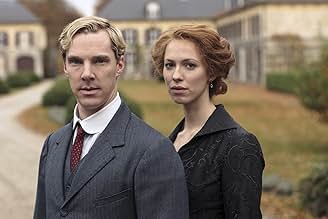NOTE IMDb
7,4/10
11 k
MA NOTE
Ajouter une intrigue dans votre langueRevolves around a love triangle between a conservative English aristocrat, his mean socialite wife and a young suffragette.Revolves around a love triangle between a conservative English aristocrat, his mean socialite wife and a young suffragette.Revolves around a love triangle between a conservative English aristocrat, his mean socialite wife and a young suffragette.
- Nommé pour 5 Primetime Emmys
- 8 victoires et 36 nominations au total
Parcourir les épisodes
Avis à la une
The first thing about this series is that the photography and production design is sumptuous and stunning. Even if the story and characters were of no interest, the visual appeal of this is memorable.
The only strange thing in this aspect of the production is that the music in scenes for the parties is jazz - 1920s sounding jazz. It is very odd and historically inaccurate for the social status of the story as jazz entered England in 1919, apparently.
As to the core of it, well, it is an abbreviated working of a complex set of novels written in a certain way and Stoppard has done well with the time limits etc of the medium. It works but one is always aware of what is being abridged to make it fit.
Cumberbatch is the most intense, internal English leading man in a long while and seems to have borrowed Jeremy Irons's mandible crunching pensiveness. But he is absolutely right here.
Hall as Sylvia Tietjens is ravishing and confused in right order. Her performance is entitled' and arrogant, though it might be a bit too modern in its overtness.
Highly recommended.
The only strange thing in this aspect of the production is that the music in scenes for the parties is jazz - 1920s sounding jazz. It is very odd and historically inaccurate for the social status of the story as jazz entered England in 1919, apparently.
As to the core of it, well, it is an abbreviated working of a complex set of novels written in a certain way and Stoppard has done well with the time limits etc of the medium. It works but one is always aware of what is being abridged to make it fit.
Cumberbatch is the most intense, internal English leading man in a long while and seems to have borrowed Jeremy Irons's mandible crunching pensiveness. But he is absolutely right here.
Hall as Sylvia Tietjens is ravishing and confused in right order. Her performance is entitled' and arrogant, though it might be a bit too modern in its overtness.
Highly recommended.
I don't like watching series or movies based on the wars but I watched this because of Benedict Cumberbatch and I have fallen in love with this series. I have not read the novels or have any idea about the writer but if the books are even half as good as the TV adaptation, they must be a must- read. Christopher Teijens is a brilliant, very committed and decent gentleman. He has a wife who cheats on him and he is love with a girl. At the backdrop is the world war 1. If you are looking for a story, there is not much of it but the true star of the show is the direction, cinematography, amazingly poetic dialogues and unblemished acting by the whole cast. The music compliments the settings and the backdrop very well. Benedict Cumberbatch has shown the world how talented he is. Flawless acting, deep emotions and superb voice modulations. Rebecca Hall and Adelaide Clemens have made the characters of Sylvia and valentine unforgettable.
Don't watch this if you are a fan of fast paced action. This is for patient, connoisseurs of literature and romantics. Watch it for intelligent viewership.
Don't watch this if you are a fan of fast paced action. This is for patient, connoisseurs of literature and romantics. Watch it for intelligent viewership.
I'm sure that HBO marketing execs were relieved that, if they were going to get behind a 5-part series based on Ford Madox Ford's complex and not terribly well known 20th-century masterpiece, at least some of it would be set in a stately home in the north of England, like that other show about the downtown abbey.
Ford's a great one for interior monologue and multiple points of view and such, but Tom Stoppard's masterly adaptation channels the great muddy river of his prose into a lively, involving narrative—though there's still enough time-shifting and flashbacking, even some Eisenstein-style montage, to do honor to Ford's avant-garde intentions. Considering what difficult material he's dealing with, it's one of the best TV adaptations ever!
Benedict Cumberbatch has always done well in period films, and he seems like the only possible choice for Christopher Tietjens, a self-styled 18th-century gentleman (the time period of the series is roughly 1908-19) and omniscient civil servant, but obstinate, brusque and arrogant as well (maybe even a little like Sherlock?). Rebecca Hall is riveting and surprisingly sympathetic as Tietjens's deceitful wife, Sylvia, and Aussie actress Adelaide Clemens is a revelation as Valentine, the virginal suffragette he meets and falls in love with in two of the series's most powerful scenes. (Tietjens and Sylvia, though usually at cross-purposes, are determined not to divorce—it's complicated .)
Tietjens is described by one of his wife's admirers as a "bloody great bolster" of a man—BC didn't have time to bulk up for the part, obviously—but he emerges as a poignant, even romantic, figure, with only the memory of the night he falls in love with Valentine to sustain him through six years of frustration, disappointment and danger. Perhaps it's easy to see why some viewers didn't find this storyline or this character very "relatable."
Long story short, '"Parade's End" isn't as accessible as an original costume drama devised for a contemporary audience, like "Downton," but it's decidedly worth watching. We didn't have a problem with BC's enunciation, but some of the dialogue, especially in the scenes with excited Welsh soldiers in the trenches, is admittedly not so easy to follow. (Next time we'll try the subtitles.) Great cinematography; kudos to the first-rate British cast, with special mention to Stephen Graham as Tietjens's fair-weather friend Macmasters and Rufus Sewell in a Pythonesque turn as a sex-crazed clergyman. An interview with Stoppard on disc two sheds some light on his process.
Ford's a great one for interior monologue and multiple points of view and such, but Tom Stoppard's masterly adaptation channels the great muddy river of his prose into a lively, involving narrative—though there's still enough time-shifting and flashbacking, even some Eisenstein-style montage, to do honor to Ford's avant-garde intentions. Considering what difficult material he's dealing with, it's one of the best TV adaptations ever!
Benedict Cumberbatch has always done well in period films, and he seems like the only possible choice for Christopher Tietjens, a self-styled 18th-century gentleman (the time period of the series is roughly 1908-19) and omniscient civil servant, but obstinate, brusque and arrogant as well (maybe even a little like Sherlock?). Rebecca Hall is riveting and surprisingly sympathetic as Tietjens's deceitful wife, Sylvia, and Aussie actress Adelaide Clemens is a revelation as Valentine, the virginal suffragette he meets and falls in love with in two of the series's most powerful scenes. (Tietjens and Sylvia, though usually at cross-purposes, are determined not to divorce—it's complicated .)
Tietjens is described by one of his wife's admirers as a "bloody great bolster" of a man—BC didn't have time to bulk up for the part, obviously—but he emerges as a poignant, even romantic, figure, with only the memory of the night he falls in love with Valentine to sustain him through six years of frustration, disappointment and danger. Perhaps it's easy to see why some viewers didn't find this storyline or this character very "relatable."
Long story short, '"Parade's End" isn't as accessible as an original costume drama devised for a contemporary audience, like "Downton," but it's decidedly worth watching. We didn't have a problem with BC's enunciation, but some of the dialogue, especially in the scenes with excited Welsh soldiers in the trenches, is admittedly not so easy to follow. (Next time we'll try the subtitles.) Great cinematography; kudos to the first-rate British cast, with special mention to Stephen Graham as Tietjens's fair-weather friend Macmasters and Rufus Sewell in a Pythonesque turn as a sex-crazed clergyman. An interview with Stoppard on disc two sheds some light on his process.
Not since A Dance to the Music of Time has such a stellar cast been allied to such an artful and unusual script.
Ford Madox Ford is not a popular novelist. His work often approaches its subjects on an elliptical curve, his principal characters are seldom in the mainstream of society, forming odd relationships, requiring his audience to assimilate their understanding of them over the course of a whole work rather than categorise from their experience (or jump to conclusions based on genre). This explains why we don't see his work adapted very often. Or even at all.
Susanna White and Tom Stoppard have both grasped the nettle of demonstrating this sideways approach, though I'm not sure quite so many kaleidoscopic shots were necessary to drive the point home. Benedict Cumberbatch joins in, underlining his character's isolation with some rather off-putting facial gestures. Ronald Hines played Tietjens in the now lost 1960's adaptation and casting to type may have worked better than struggling with toning down the matinée idol status Cumberbatch has acquired since hitting Sherlock Holmes out of the park. Maybe if he and Stephen Graham had swapped roles the other characters might have found it easier to deal with Tietjens' self-enforced oddity but that may have impaired Ford's central point, beautifully delivered as the the climax to Episode 4.
But acting idiosyncrasies cannot mask the quality of the fabulous script or the overall adaptation which has a towering performance from Rebecca Hall and glittering additions from Rufus Sewell, Rupert Everett, Miranda Richardson, Roger Allam, Ann-Marie Duff and beautiful, note-perfect newcomer Adele Clemens.
With so much glossy soap about, it is extremely refreshing to have high quality, thought-provoking, challenging drama this good whatever the lead chooses to do with his jaw muscles.
A keeper.
Ford Madox Ford is not a popular novelist. His work often approaches its subjects on an elliptical curve, his principal characters are seldom in the mainstream of society, forming odd relationships, requiring his audience to assimilate their understanding of them over the course of a whole work rather than categorise from their experience (or jump to conclusions based on genre). This explains why we don't see his work adapted very often. Or even at all.
Susanna White and Tom Stoppard have both grasped the nettle of demonstrating this sideways approach, though I'm not sure quite so many kaleidoscopic shots were necessary to drive the point home. Benedict Cumberbatch joins in, underlining his character's isolation with some rather off-putting facial gestures. Ronald Hines played Tietjens in the now lost 1960's adaptation and casting to type may have worked better than struggling with toning down the matinée idol status Cumberbatch has acquired since hitting Sherlock Holmes out of the park. Maybe if he and Stephen Graham had swapped roles the other characters might have found it easier to deal with Tietjens' self-enforced oddity but that may have impaired Ford's central point, beautifully delivered as the the climax to Episode 4.
But acting idiosyncrasies cannot mask the quality of the fabulous script or the overall adaptation which has a towering performance from Rebecca Hall and glittering additions from Rufus Sewell, Rupert Everett, Miranda Richardson, Roger Allam, Ann-Marie Duff and beautiful, note-perfect newcomer Adele Clemens.
With so much glossy soap about, it is extremely refreshing to have high quality, thought-provoking, challenging drama this good whatever the lead chooses to do with his jaw muscles.
A keeper.
I personally doubt that keywords such as 'love triangle' or 'suffragette' do any justice to this excellent rendition of Ford's novel. Christopher Tietjens' so very noble, honorable and occasionally heroic behaviour in every aspect of his intentions and actions, as well as the overall background of WWI petty intrigues, the so vivid rendition of the atrocious human suffering & desperation on the front line are the true show stealer. Excellent performances by all cast, in particular Benedict Cumberbatch (huge in his role !!!), Rebecca Hall and Adelaide Clemens... Oops ! This is the very 'love triangle' I was arguing against just a few seconds ago... One more actor who's absolutely perfect in his role is Roger Allam, as General Campion. Drawing the line: viewers of all ages and every level of education should find this series to match every bit of their expectations... Irrespective whether these rather look towards the 'love triangle'... or they go much deeper into psychoanalysis of intimate family, friendship, love relations or the noblesse of human behaviour under deeply stressful conditions. Today's human society is in serious need of individuals such as Christopher Tietjens... (not really the 'last' parade... I hope...). Highly recommended, absolutely nothing is obsolete or worthless in this movie rendition of British society during the WWI years !
Le saviez-vous
- AnecdotesBenedict Cumberbatch claimed that his character of Christopher Tietjen was one of the more admirable he has ever played. He claimed "[Christopher] has many admirable qualities I'd like to siphon off into my life."
- GaffesSylvia and Bobbie smoke cigarettes, but several others certainly would have been smokers, including the Ladies Macmaster, Wonnop, Satterthwaite, Marie-Leonie, and Claudine.
- ConnexionsFeatured in The Wright Stuff: Épisode #17.165 (2012)
Meilleurs choix
Connectez-vous pour évaluer et suivre la liste de favoris afin de recevoir des recommandations personnalisées
- How many seasons does Parade's End have?Alimenté par Alexa
Détails
- Date de sortie
- Pays d’origine
- Langue
- Aussi connu sous le nom de
- Geçit Töreni Sonu
- Lieux de tournage
- Duncombe Park, Helmsley, York, North Yorkshire, Angleterre, Royaume-Uni(Groby Hall: Tietjens family's country estate)
- Sociétés de production
- Voir plus de crédits d'entreprise sur IMDbPro
Contribuer à cette page
Suggérer une modification ou ajouter du contenu manquant

Lacune principale
By what name was Parade's End (2012) officially released in India in English?
Répondre

